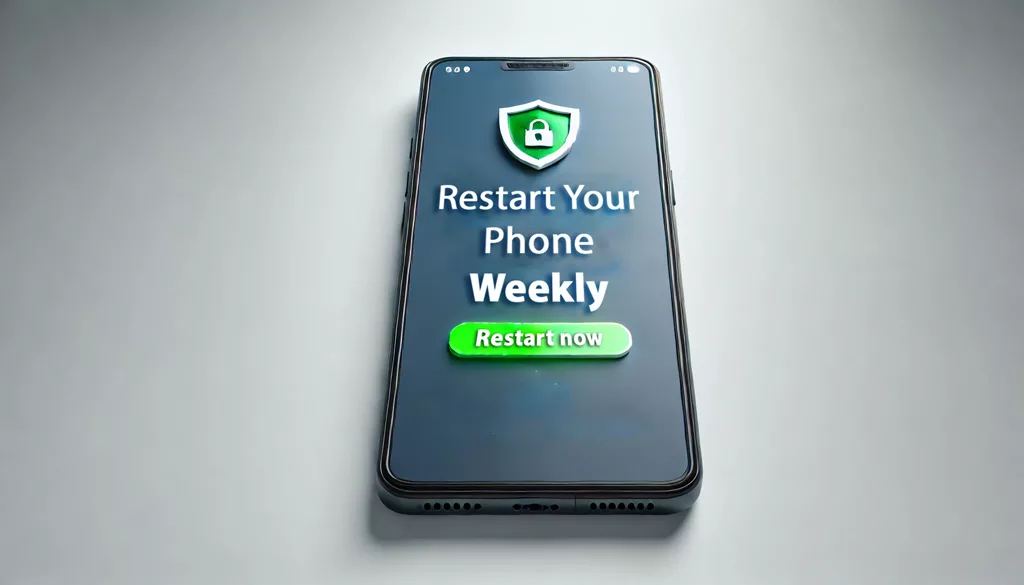2024, Cyberculture
Restart Your Phone Weekly for Mobile Security and Performance
Restart your phone weekly by Jacques gascuel I will keep this article updated with any new information, so please feel free to leave comments or contact me with suggestions or additions.his article will be updated with any new information on the topic, and readers are encouraged to leave comments or contact the author with any suggestions or additions.
Restart Your Phone Weekly to Enhance Mobile Security
Restarting your phone weekly is a simple yet powerful action to disrupt malware and improve device performance. By building this habit, you actively protect your data from threats like zero-click exploits and memory-resident malware. Additionally, cybersecurity experts and agencies such as the NSA recommend regular reboots to reinforce device security. Discover how advanced tools and essential practices can elevate your mobile security. Explore NSA’s full guidance here.
The Importance of Restarting Your Phone Weekly for Enhanced Mobile Security
Restarting your phone weekly is a proactive step that not only disrupts persistent malware but also prevents zero-click exploits from establishing a foothold. By making this a regular habit, you strengthen your mobile security routine and shield sensitive data from cyber threats. Both the NSA and cybersecurity experts emphasize the necessity of weekly restarts to secure devices against today’s advanced threats.
Why Restarting Your Phone Weekly Matters for Cybersecurity
Simply taking a few seconds each week to restart your smartphone can be one of the easiest yet most powerful ways to guard against cyber threats. Whether clearing out memory-based malware or preventing fileless attacks, a weekly reboot reduces these risks. This article explores why experts endorse this practice and how it safeguards your device. Learn how this small step can significantly enhance your mobile security.
Benefits of Restarting Your Phone Weekly
Because various types of malware exploit active system processes or reside in memory, restarting your phone flushes RAM and prevents malware from operating undetected. This step is particularly crucial against complex threats like zero-click attacks that don’t require user action.
Emphasis on Remote and Physical Attack Risks
In today’s mobile security landscape, your phone is vulnerable to multiple attack vectors. For instance, remote threats like zero-click exploits are particularly dangerous since they require no user interaction. Attackers use these techniques to install malware remotely, exploiting vulnerabilities in the operating system. Spyware, such as Pegasus, can infiltrate devices without any user action. Rebooting your phone disrupts these attacks, removing malware from memory, even if only temporarily.
Physical access to your device, however, poses equally significant risks. Malicious actors can install malware if they briefly access your device, particularly through compromised USB charging stations or public Wi-Fi networks. Additionally, attackers use juice jacking—installing harmful software or stealing data through public charging ports—as a common method. By disabling unused features like Bluetooth and location services, you reduce the likelihood of proximity-based attacks.
Types of Malware Removed by Restarting
- Memory-Resident Malware: Malware hiding in RAM is eliminated when memory clears during a reboot.
- Temporary Spyware: Spyware that monitors user behavior is disabled when sessions end.
- Zero-Click Exploits: Malware like Pegasus is disrupted temporarily by restarting.
- Session Hijacking Attempts: Malicious scripts exploiting browser or network sessions are stopped after a phone reboot.
- Memory-Based Rootkits: Rootkits modifying system files in RAM can be temporarily removed by restarting.
Best Practices from Security Agencies
In addition to restarting, the NSA recommends several best practices to secure your mobile device fully:
- Update software regularly: Patch security holes by keeping your operating system up-to-date.
- Enable multi-factor authentication (MFA): Secure accounts with an extra layer of protection.
- Turn off unnecessary services: Disable Bluetooth, Wi-Fi, and location services when not in use, limiting exposure to threats like juice jacking.
Additionally, the NSA emphasizes avoiding public USB charging stations, as these can be hotspots for malware injections. Access the NSA’s complete mobile security guidelines to further enhance your mobile security.
Best Practices from Security Agencies
In addition to restarting, the NSA recommends a range of mobile security practices, which include updating your software regularly, enabling multi-factor authentication, and turning off unnecessary services to limit exposure to cyber risks.
- Update your software regularly: Patch any security holes by keeping your operating system updated.
- Enable multi-factor authentication (MFA): Secure your accounts with an extra layer of protection.
- Turn off unnecessary services: Disable Bluetooth, Wi-Fi, and location services when not in use. This limits exposure to potential attacks, such as juice jacking from public USB ports.
Mobile Malware Statistics
In 2023, mobile devices faced heightened security challenges, with Kaspersky reporting over 5.6 million mobile malware and adware attacks blocked in the third quarter alone. Threats like Trojan-Droppers and zero-click exploits increased significantly, highlighting the need for stronger mobile security practices to combat persistent and evolving malware..
As of Q1 2024, Kaspersky’s data shows a continued rise in mobile malware activity, blocking over 10.1 million attacks globally. Adware represented 46% of these threats, and Trojan-type malware attacks rose to include 35% of detected malicious programs. Memory-resident malware, zero-click attacks, and financial-targeted Trojans continue to compromise legitimate platforms and apps, with new exploits targeting modified versions of popular applications like WhatsApp
Rising Concerns
Increasing zero-click malware, like Pegasus spyware, which bypasses user actions, has raised alarms about mobile device security. As mobile devices carry more sensitive data, attackers find new ways to exploit them. To counter these risks, security practices like weekly device reboots are recommended to temporarily disrupt these threats.
For a more in-depth view of these statistics and trends, you can view the latest report from Kaspersky here.
Elevate Mobile Security with DataShielder, PassCypher, and EviCall NFC HSM Solutions
Restarting your phone weekly is an effective way to disrupt temporary malware, but protecting your sensitive communications requires advanced tools. DataShielder NFC HSM, a dual-use hybrid encryption product designed for NFC-enabled Android devices, offers robust protection. Paired with PassCypher NFC HSM and EviCall NFC HSM, this suite provides comprehensive protection for encryption keys, passwords, and communication data, ensuring that your sensitive information stays secure.
How DataShielder NFC HSM Secures Messaging
DataShielder NFC HSM offers real-time encryption for all messaging services, including SMS, emails, and instant messaging apps like WhatsApp and Telegram. This system encrypts data in volatile memory, ensuring that sensitive information isn’t stored permanently. Even if your phone is compromised, attackers can’t access encrypted data, as DataShielder operates offline without servers or databases.
Managing Secure Communication with EviCall NFC HSM
With EviCall NFC HSM, you can make calls directly from contacts stored in the NFC HSM, leaving no trace on the phone itself. After calls, the system automatically erases call logs, SMS, and related data, ensuring that sensitive information remains secure.
Managing Passwords and Keys with PassCypher NFC HSM
PassCypher NFC HSM securely manages passwords, TOTP, and HOTP keys. Storing encryption keys and sensitive credentials in volatile memory ensures that no data persists after use, preventing phishing attacks or malware from accessing crucial credentials.
Comprehensive Security with DataShielder NFC HSM Solutions
By combining DataShielder NFC HSM, PassCypher, and EviCall, users gain a complete security solution protecting encryption keys, communications, and passwords. Paired with regular phone reboots, these tools offer robust defense against modern cyber threats, ensuring privacy and security across personal and professional data.








